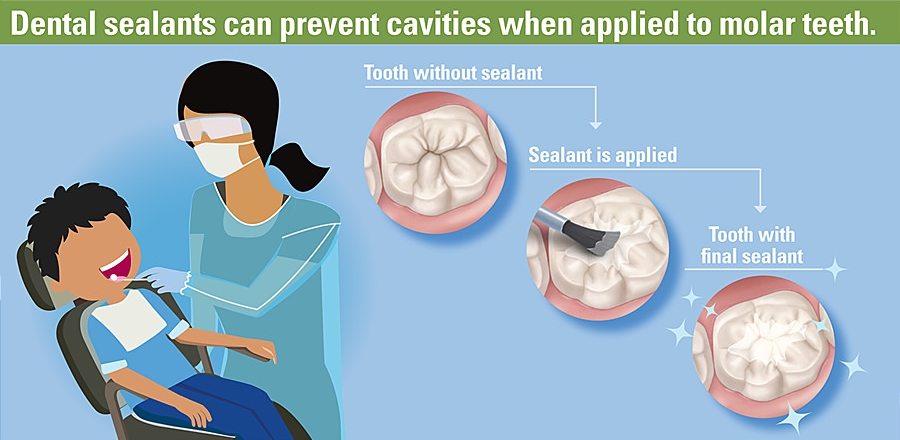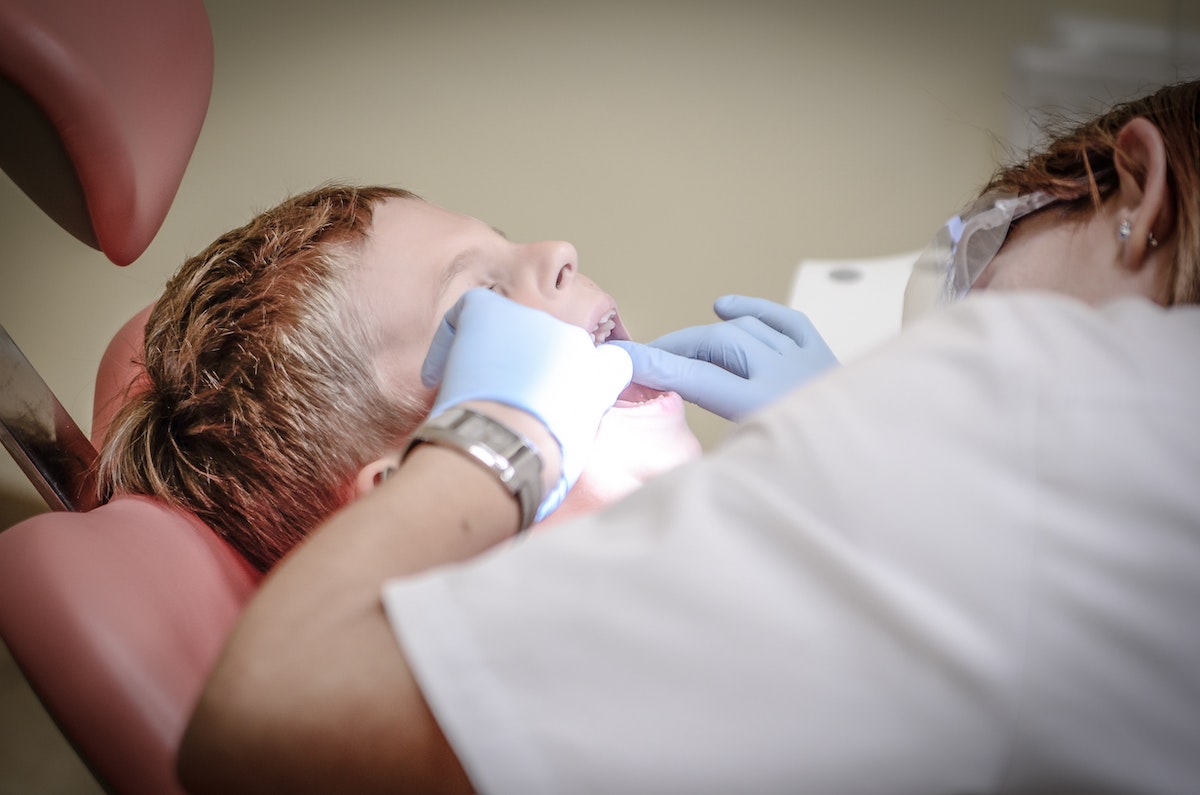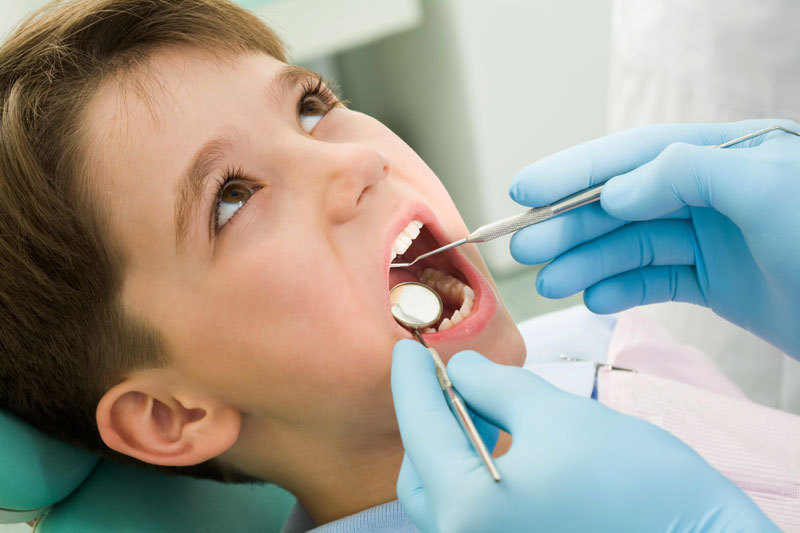It is natural for parents to want what is best for their kids, and that includes their dental health. To prevent cavities, some parents invest in dental sealants for their children. How young is too young to get sealants? Can a dentist put sealants on baby teeth?
While sealants are typically applied to permanent teeth, there may be situations where the dentist might suggest them for a baby’s primary teeth. Understanding what sealants are and how they work can help parents decide if they are a good choice for their child.
What are Dental Sealants?
A tooth’s surface is covered in bumps and grooves where food can stick, turning into a sticky substance called plaque. Gradually, the plaque will eat away at the tooth’s enamel, especially when it sits in those nooks and crannies and gets missed during normal brushing.
Dental sealants are a clear plastic-like resin that starts out in liquid form. The dentist paints the resin onto the surface of the tooth. It dries within seconds, forming a hard coating that fills in the natural rough contours of the teeth, making them smoother and easier to brush clean. Sealants also act as a barrier to keep out the acids and bacteria that cause plaque and tooth decay.
Are Dental Sealants a Good Idea?

The best part about sealants is they work. Tooth decay is considered to be one of the most common chronic diseases in children across the world. And children without sealants typically have 3 times more cavities than those who have them.
Dental sealants have a lot of pros and very few cons for both children and their parents. They are safe and getting them does not hurt. While they do not last forever and may not be covered by dental insurance, many parents see sealants as a good investment in their child’s dental health.
Doing what one can to prevent a problem is always preferable to fixing it once it occurs. With a quick, painless procedure, children can reduce their chances of getting cavities. For the child, this means better overall dental health and avoiding the pain and anxiety that can come along with treating cavities. Parents are happy to save their child from that experience, not to mention saving money on future fillings and in the worst cases root canals or tooth extractions.
Even Though They Fall Out, Baby Teeth Matter
It makes sense that children could benefit from sealants. School-age is when kids are most likely to get cavities. According to the CDC, 1 in 5 children between the ages of 5 and 11 have at least one untreated cavity. The number only goes down to 1 in 7 for kids aged 12 to 19.
Cavities can occur in baby teeth just as easily as in adult teeth. It is important to remember that kids still have baby teeth even when they are no longer considered babies. Primary teeth start to fall out around age 5, but their final baby tooth might still be around until about age 12. So, many of the cavities mentioned in the statistic above are, indeed, in baby teeth.
Healthy baby teeth are important. Cavities can be painful for little ones, making it difficult for them to eat and get the proper nutrition, affecting their growth and development. And if a cavity forms when a child is 3, it could potentially be in the mouth for a full decade before it falls out. The cavity can spread leading to severe infections and even bone loss.
Pulling the teeth before they’re ready to fall out is not a good idea either. Missing teeth interfere with eating as well as with speaking. Plus, baby teeth are placeholders for adult teeth. Without them guiding new tooth growth, chances of misalignment and crookedness increase.
A cavity in a baby tooth is treated in the same way as one in an adult tooth—with a dental filling. Parents should not just simply wait until the tooth falls out. Avoiding decay in the first place can spare the child the pain of the cavity and the discomfort of the filling procedure.
The Best Age for Sealants

Can a dentist put sealants on baby teeth? Yes. If a child is particularly cavity-prone, a dentist might recommend dental sealants. There is no age restriction on using them. But because the treatment requires the child to sit still in the dentist’s chair, it may be difficult for very young kids. Parents may want to consider a pediatric dentist who is used to dealing with very small children and has the right equipment and environment to suit them.
More often, dentists wait until the child is a bit older and most of their permanent teeth come in. Every child is different but in general this would be somewhere around age 6 to 8.
Sealants are very effective in preventing cavities, especially when they are put on the chewing surface of the molars at the back of the mouth. Dentists will usually monitor a young patient’s teeth, and apply the sealants as the adult teeth emerge.
Dental Sealants vs. Dental Fillings
It is important that parents take children to the dentist twice each year for checkups, and practice good oral hygiene at home. Regular brushing and flossing will help keep teeth clean and cavity free, and so can sealants.
Getting sealants is painless and safe. Some people are concerned about BPA, but there is less of that substance in dental sealants than in many foods, dust, and even the air we breathe. Sealants cost on average about $30 to $60 per tooth (prices depend on the dentist and the city) and can last for 10 years.
Consider that in that same 10 year period, a child might get several cavities. Even using the least expensive amalgam fillings (commonly called silver fillings) they will cost roughly $100 each to fix. Opting for resin composite that matches the color of the tooth will cost around $135 each at the low end. Porcelain is even more expensive.
The monetary cost is just one drawback of getting fillings. Even though dentists do a lot to make the procedure comfortable, no kid likes to have their teeth drilled. And no parent likes their child to be scared or in pain.
Whenever a problem like a cavity can be prevented, it is usually a good investment. Dental sealants can save money and a child’s comfort in the long run.
Getting Your Child Dental Sealants
Talk to your dentist about dental sealants to prevent your kids from getting cavities. They may not recommend them for your child’s baby teeth, but they can apply them once their permanent teeth appear. Meanwhile, they can watch for signs of cavities during regular dental visits, and treat them if they appear.
If you would like to find a dentist near you who treats children, use our online search tool. Our database includes family dentists and pediatric dentists all over the country, and makes it easy to schedule an appointment.


